By : Halimah binti Ma’alip
School : Language Academy
Audience : Undergraduate
Language : Bahasa Melayu
Description:
Video ini menerangkan kepada pelajar luar negara tentang jenis-jenis warna dalam bahasa Melayu.

By : Halimah binti Ma’alip
School : Language Academy
Audience : Undergraduate
Language : Bahasa Melayu
Description:
Video ini menerangkan kepada pelajar luar negara tentang jenis-jenis warna dalam bahasa Melayu.
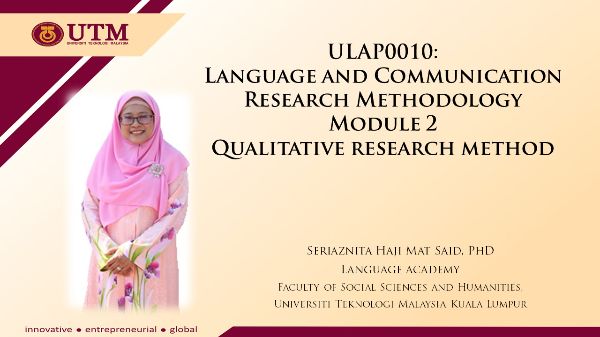
By : DR SERIAZNITA MAT SAID
School : Language Academy
Audience : Postgraduate
Language : English
Description:
At the end of the lecture, students should be able to understand the fundamentals of the following:
Formulating research problem(s)
● Constructing research objectives and questions
● Writing research objectives, and questions
Conceptualising research design
● Understanding characteristics of 5 qualitative research designs (refer to Creswell)
Selecting a sample
● Understanding characteristics of a variety of sampling designs (for qualitative samples)
● How to select a sample for your study?
Constructing research instrument
● Understanding characteristics of research instruments/tools (qualitative)
● How to construct research instrument?
● Validation of research instrument (process involved)
Deciding on data collection procedure
● What kind of data that you want to collect?
● Qualitative: Interview scripts, documents – written, non-written such as pictures etc.
Proposing data analysis
● How to select the suitable data analysis?
Type: Video
Category: Language
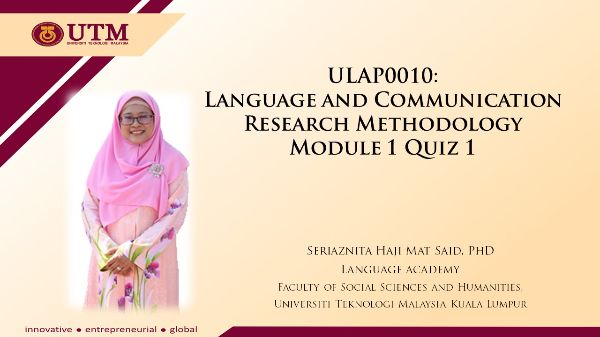
By : DR SERIAZNITA MAT SAID
School : Language Academy
Audience : Postgraduate
Language : English
Description:
MODULE 1 : Overview of Social Sciences Research
At the end of this module, students will be able to understand the following:
● What kind of issues are researchable in social sciences field?
● Ethics in social sciences research
● Philosophical underpinning of Social Sciences research design paradigm
At the end of the lecture, students are required to watch the video of Professor Gibbs’ talk at https://youtu.be/pQ4RAHXtvS0 before attempting to answer all questions in the short quiz.
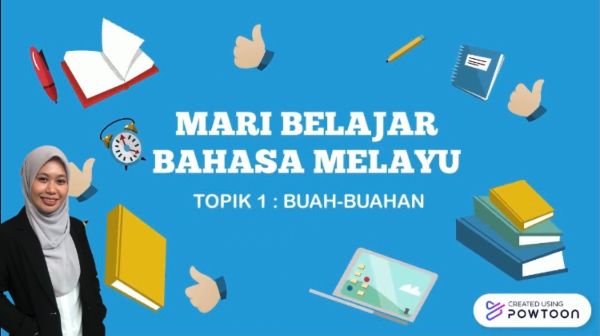
By : Halimah binti Ma’alip
School : Language Academy
Audience : Undergraduate
Language : Bahasa Melayu
Description:
Video ini menerangkan kepada pelajar luar negara tentang buah-buahan tempatan.

By : HANITA HASSAN
School : Language Academy
Audience : Postgraduate
Language : English
Description:
This lecture is on contexts of communication for the Language and Communication Theories course.
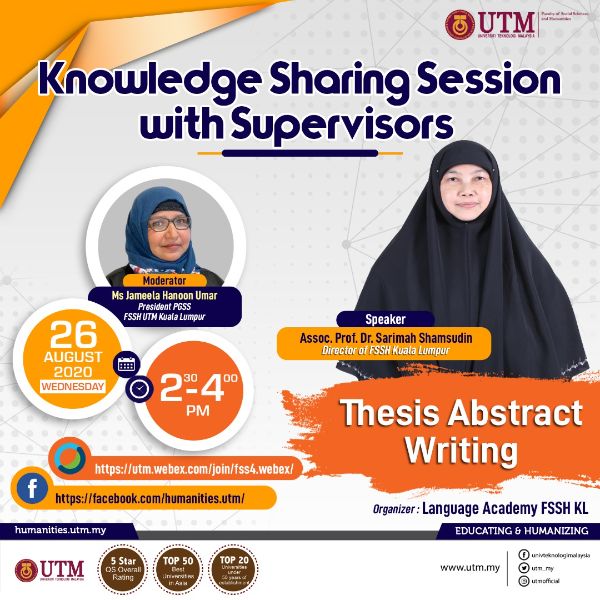
By : ASSOCIATE PROFESSOR DR. SARIMAH BINTI SHAMSUDIN
School : Language Academy
Audience : Higher Education
Language : English
Description:
This video explains about how to writing thesis abstract.
https://www.facebook.com/humanities.utm/videos/311818339878509/
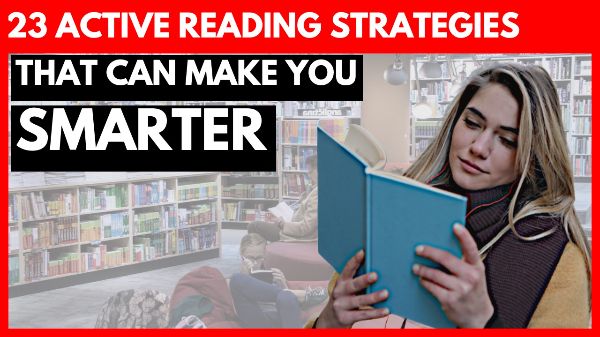
By : Zaid Shamsuddin
School : Language Academy
Audience : Anyone Interested
Language : English
Description:
If you’re looking to get rid of reading or learning difficulty, stop forgetting what you just read, and avoid missing some important points, then you are in the right place!
Whether you’re reading to get good grades, to solve some problem or improve your situation, or even to be the best at what you do, this is for you.
I’m about to reveal some easy ways to get the most out of your reading. With the same reading material, you can learn more, understand more, remember more, relate more, and put more knowledge or info to better use, all without spending too much effort thinking, too much time reading, or too much money on those extra courses and expensive vitamins.
I understand that learning difficulty can be very frustrating, and spending a lot of time reading without actually getting the most benefit feels like a waste of time. Sometimes it feels like a loser deep down inside. The clock is ticking, and the deadline is near. But don’t worry, because today I’m going to share with you 23 active reading strategies that can make you smarter.
You’re probably familiar with one or two of these strategies. Now let’s look at all 23. Just pick the right strategy that fits your current reading purpose. Or you can use two, three, or even all of these strategies if you’re up to something big.
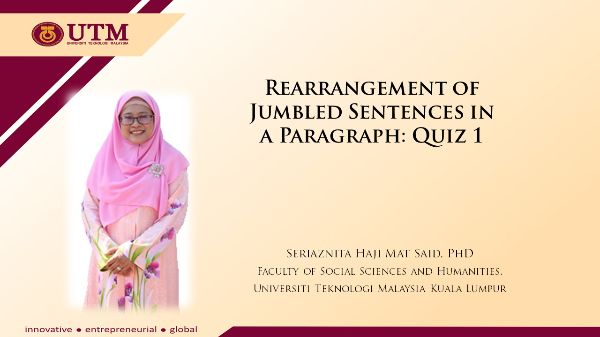
By : SERIAZNITA MAT SAID
School : Language Academy
Audience : Anyone Interested
Language : English
Description:
Description of the Quiz:
A paragraph or a section is broken into a few sections which are then scrambled up and labelled as O, P, Q, R, S etc. The quiz participant is required to put these sentences into a correct arrangement to form a cohesive paragraph and then select the right sequence from the given choices.
Rearrangement of Jumbled parts is one kind of language capability test question. It is a competitive quiz to test the candidates’ capacity to comprehend the sentences in English and develop a cohesive paragraph.
Technique of Solving:
A passage is separated in 5 or 6 sections (or sentences) with the first sentence given and the rest of the sentences are then arranged randomly.
The quiz participant has to arrange the sentences in the correct sequence with the aid of the first and last sentences of the paragraph.
To achieve a good paragraph rearrangement:
1. You have to comprehend the theme / subject behind each sentence. If you can comprehend the theme / subject of the passage, it will be easy to string the sentences all together.
2. You should pay special attention to the first and last sentences in the question. In some cases they can help you a lot in recognising the right succession.
3. You have to know the connections between various sentences to place them in the right arrangement.
4. You should first fix the connections of sentences, place them all together and afterwards check the alternatives.
5. Transition words and differentiating words additionally help in identifying clear cohesion between sentences in the paragraph.
6. Do NOT over depend on the choices given, they will just confuse you if you continue looking at them. Instead, use them as scaffolds.
7. Read the entire passage to ensure the thought is coherent and the paragraph is well organised.
#languagelearning
#Englishisfun
#quiz
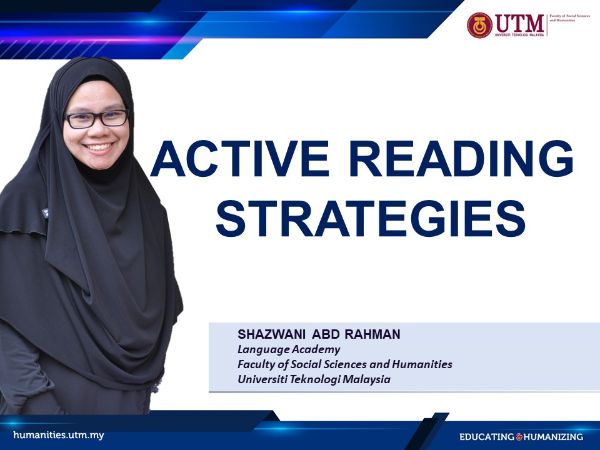
By : SHAZWANI BINTI ABD RAHMAN
School : Language Academy
Audience : Anyone Interested
Language : English
Description:
Have you ever had this experience? You’ve finished reading an article and then you asked yourself – what did I just read? You forget what you read almost as quickly as you read them. Watch this video to find out why this happened to you and how you could read better.
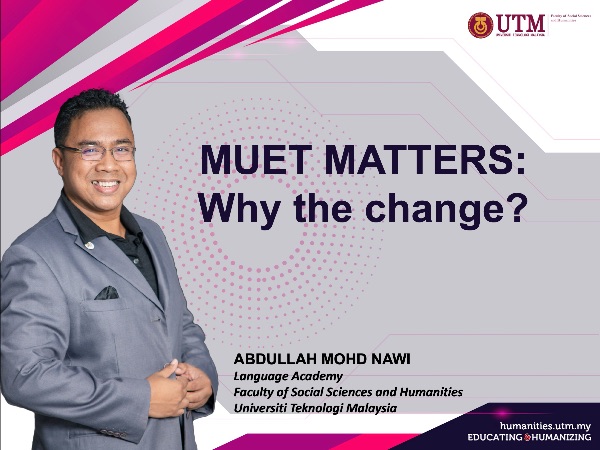
By : Abdullah Mohd Nawi
School : Language Academy
Audience : Anyone Interested
Language : English
Description:
As teachers preparing their students for MUET can attest, this is a period of great uncertainty as the new MUET will roll out in 2021, and many teachers are unsure how these changes will affect how they teach English to Pre-university students. The series MUET MATTERS will hopefully answer some of these questions, starting with the most basic – why change?